Clinical Data Analyst Resume Examples

Jul 18, 2024
|
12 min read
Crafting Your Perfect Clinical Data Analyst Resume: Analyzing the Key Sections to Showcase Your Skills and Experience
Rated by 348 people
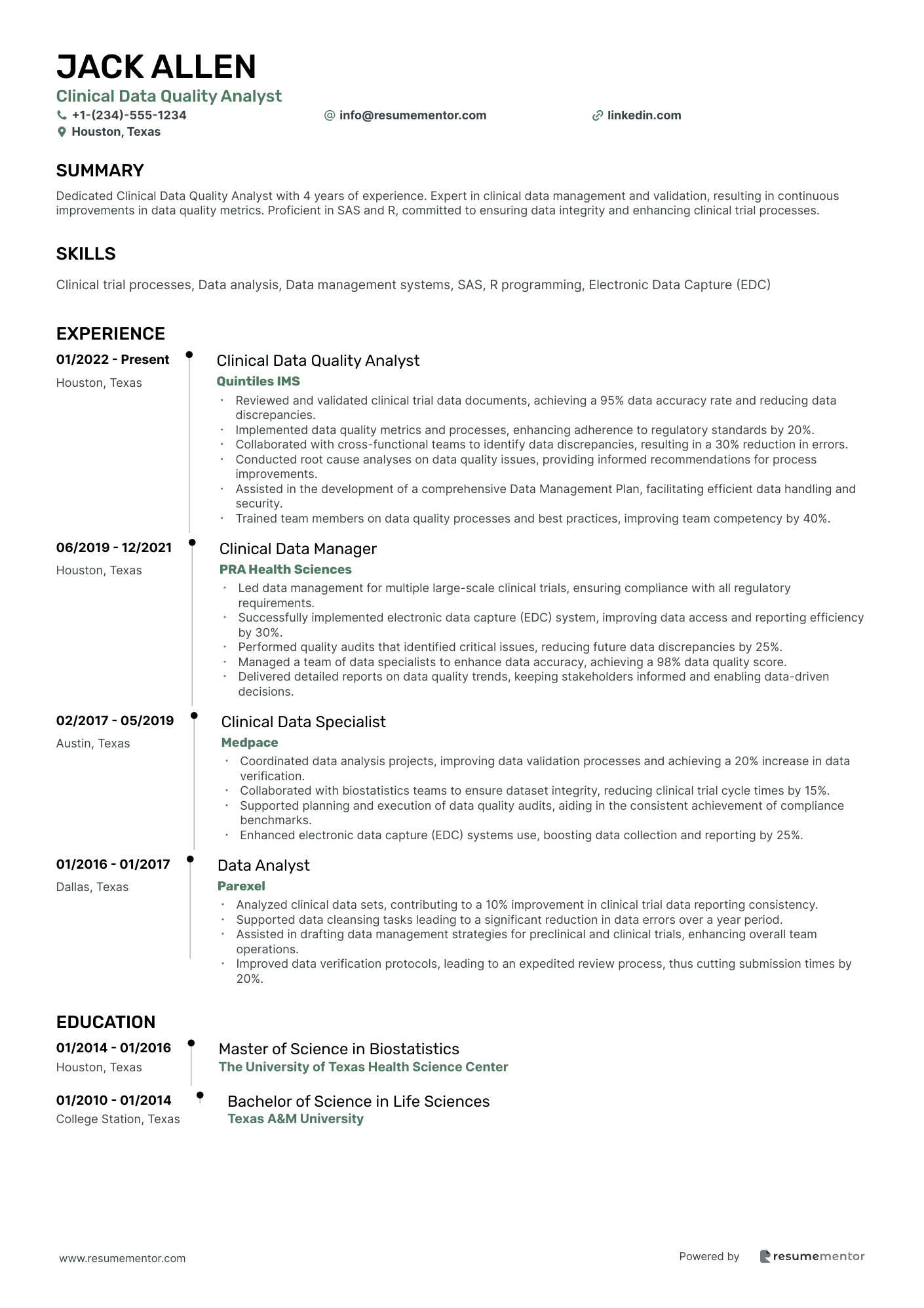
Clinical Data Quality Analyst
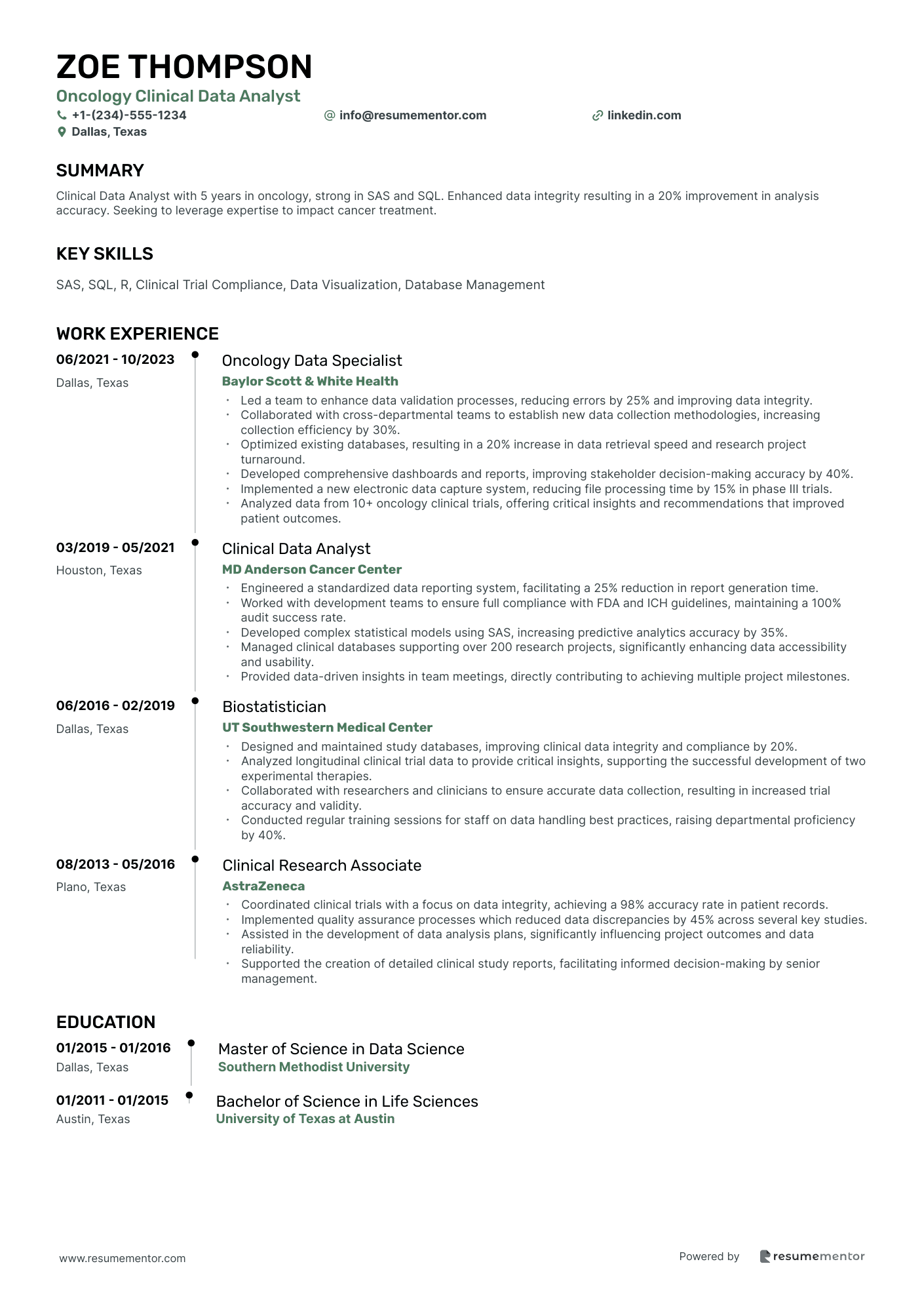
Oncology Clinical Data Analyst
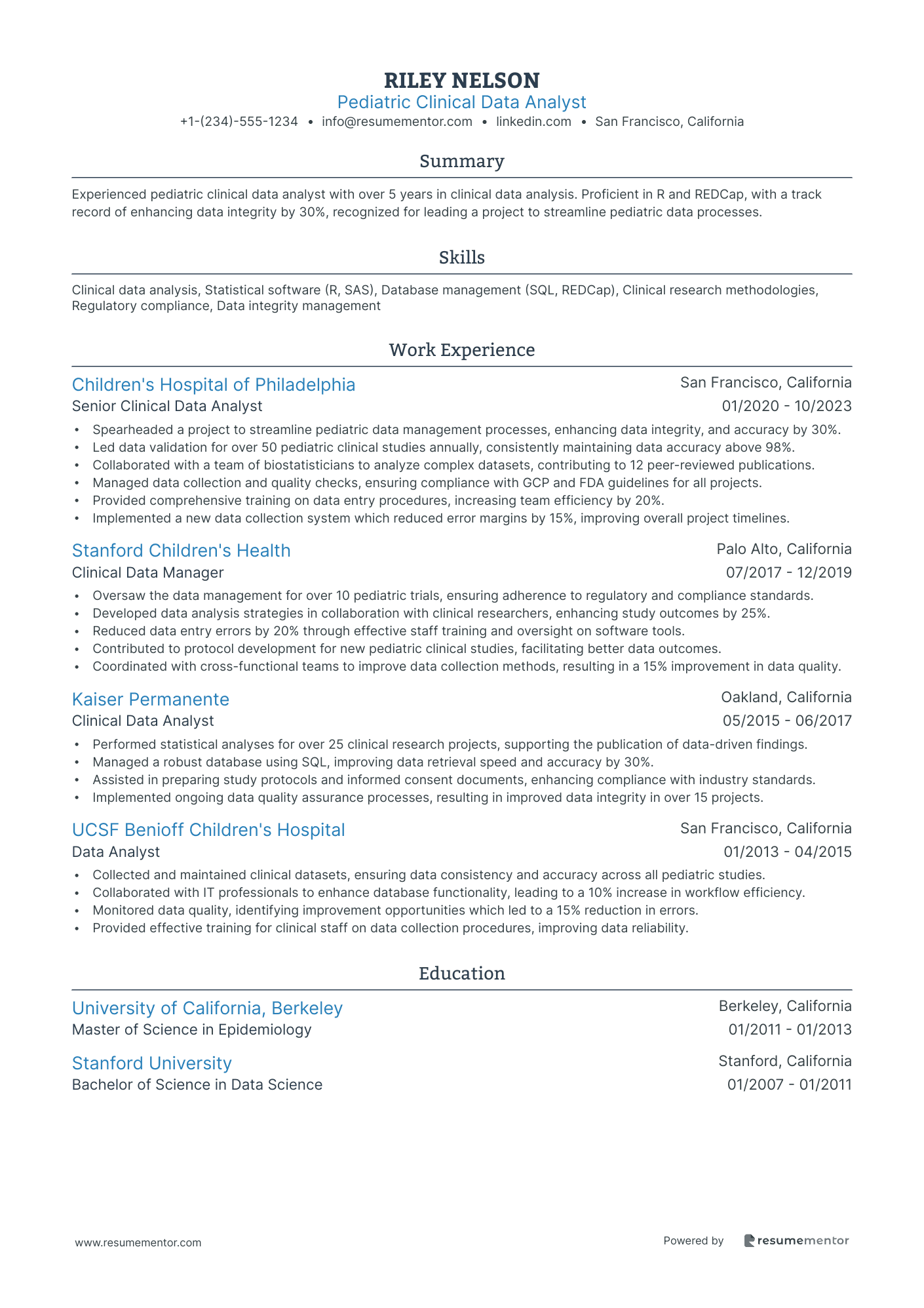
Pediatric Clinical Data Analyst
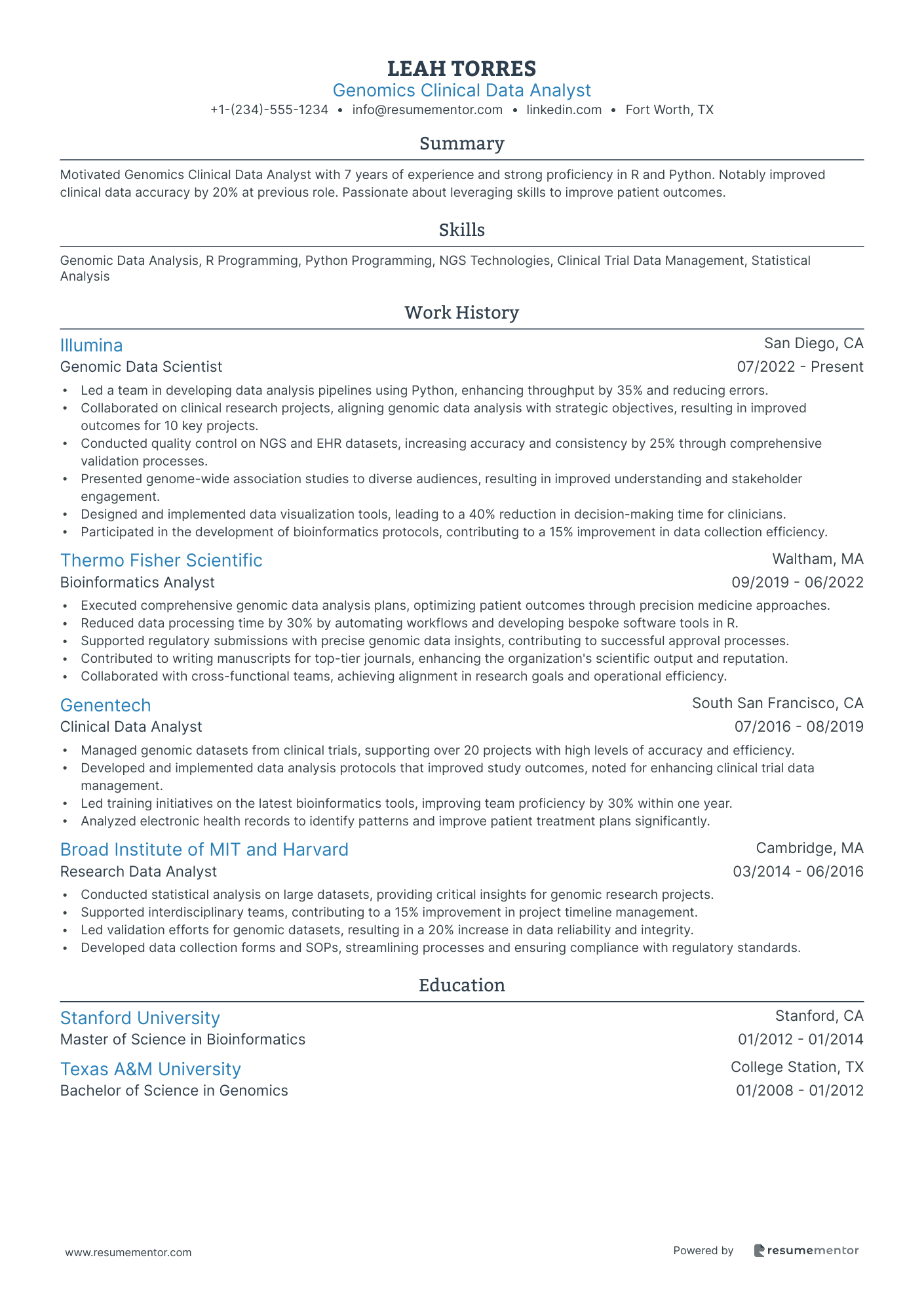
Genomics Clinical Data Analyst
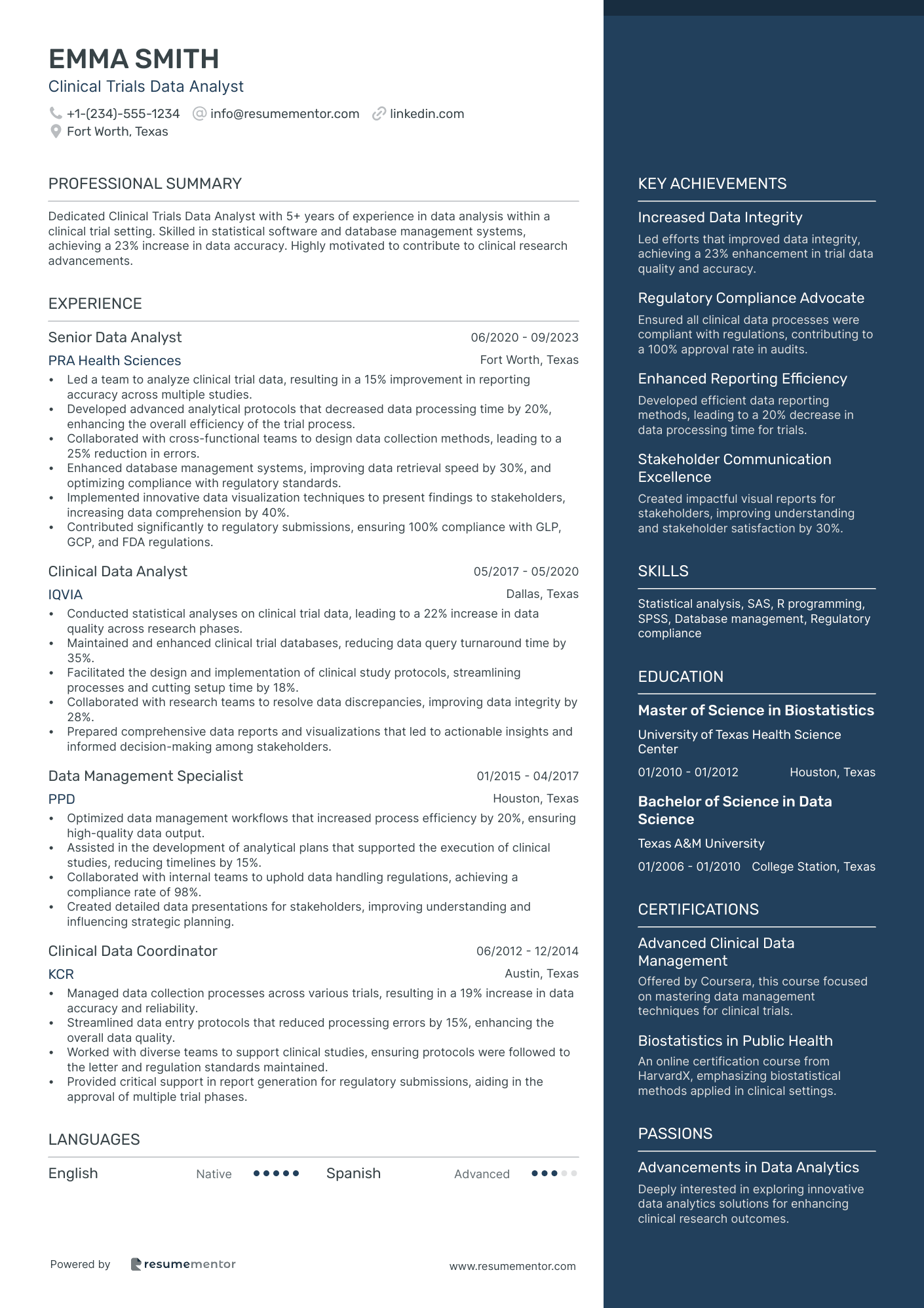
Clinical Trials Data Analyst
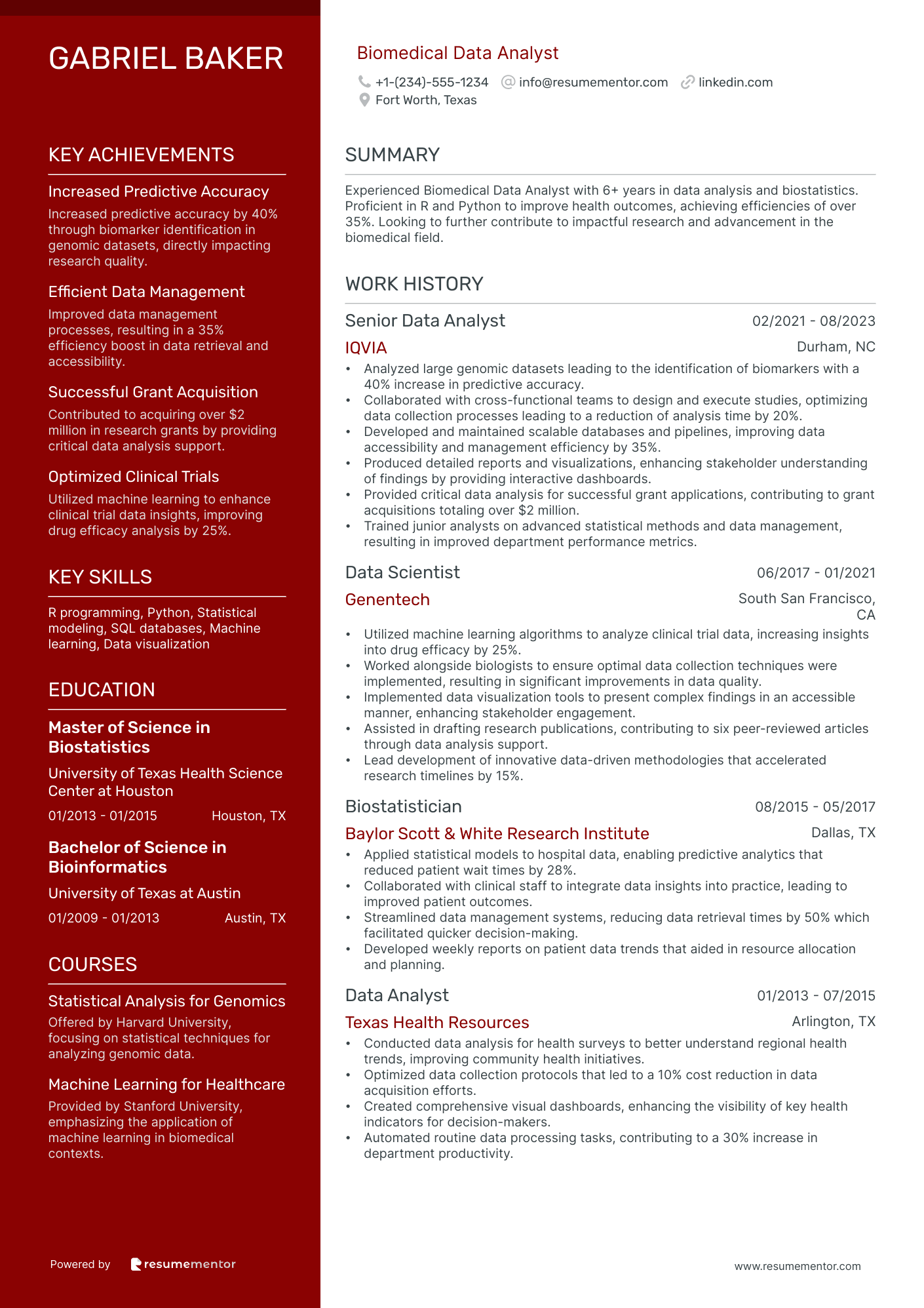
Biomedical Data Analyst
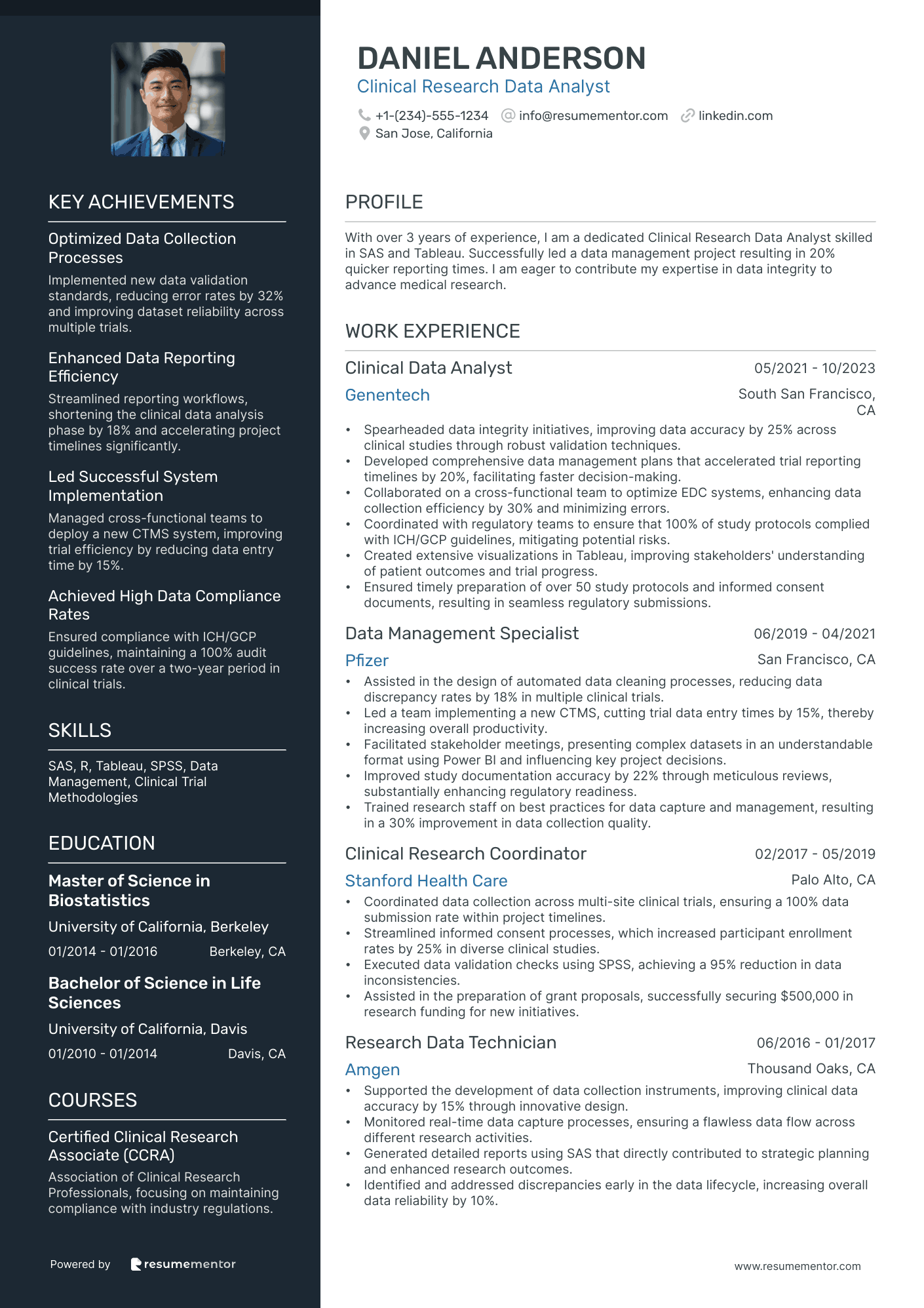
Clinical Research Data Analyst
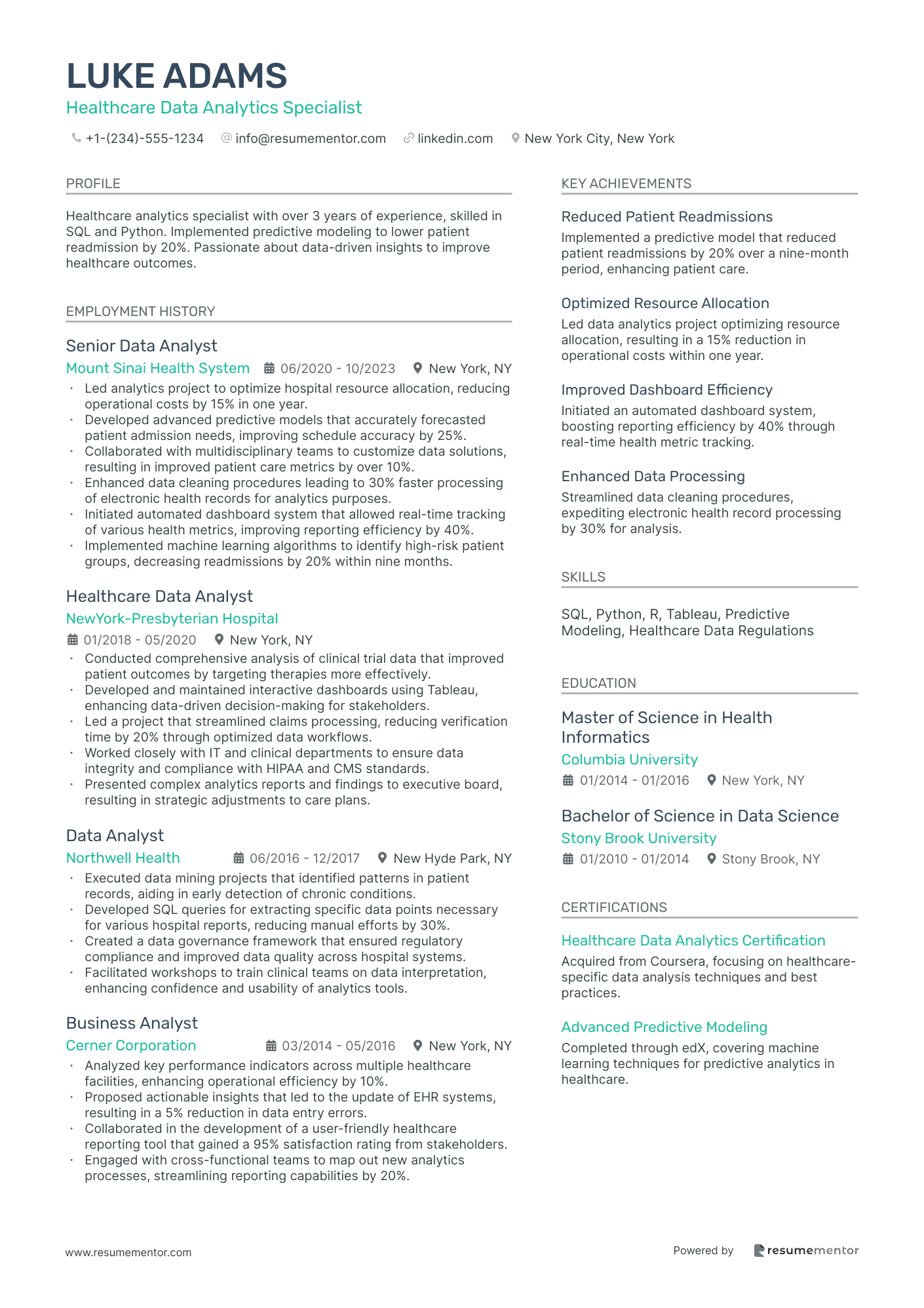
Healthcare Data Analytics Specialist
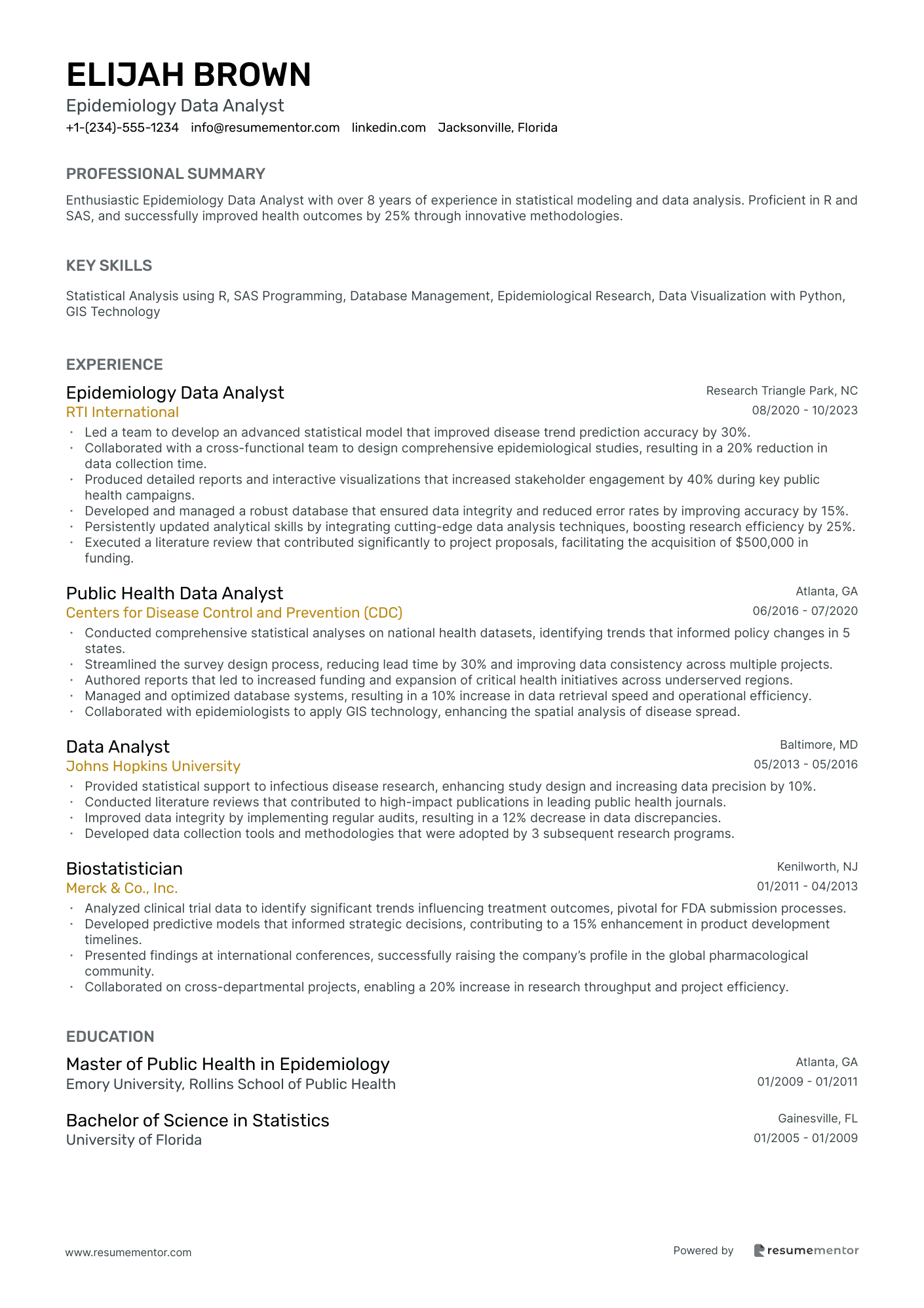
Epidemiology Data Analyst

Clinical Data Quality Analyst resume sample
- •Reviewed and validated clinical trial data documents, achieving a 95% data accuracy rate and reducing data discrepancies.
- •Implemented data quality metrics and processes, enhancing adherence to regulatory standards by 20%.
- •Collaborated with cross-functional teams to identify data discrepancies, resulting in a 30% reduction in errors.
- •Conducted root cause analyses on data quality issues, providing informed recommendations for process improvements.
- •Assisted in the development of a comprehensive Data Management Plan, facilitating efficient data handling and security.
- •Trained team members on data quality processes and best practices, improving team competency by 40%.
- •Led data management for multiple large-scale clinical trials, ensuring compliance with all regulatory requirements.
- •Successfully implemented electronic data capture (EDC) system, improving data access and reporting efficiency by 30%.
- •Performed quality audits that identified critical issues, reducing future data discrepancies by 25%.
- •Managed a team of data specialists to enhance data accuracy, achieving a 98% data quality score.
- •Delivered detailed reports on data quality trends, keeping stakeholders informed and enabling data-driven decisions.
- •Coordinated data analysis projects, improving data validation processes and achieving a 20% increase in data verification.
- •Collaborated with biostatistics teams to ensure dataset integrity, reducing clinical trial cycle times by 15%.
- •Supported planning and execution of data quality audits, aiding in the consistent achievement of compliance benchmarks.
- •Enhanced electronic data capture (EDC) systems use, boosting data collection and reporting by 25%.
- •Analyzed clinical data sets, contributing to a 10% improvement in clinical trial data reporting consistency.
- •Supported data cleansing tasks leading to a significant reduction in data errors over a year period.
- •Assisted in drafting data management strategies for preclinical and clinical trials, enhancing overall team operations.
- •Improved data verification protocols, leading to an expedited review process, thus cutting submission times by 20%.
Oncology Clinical Data Analyst resume sample
- •Led a team to enhance data validation processes, reducing errors by 25% and improving data integrity.
- •Collaborated with cross-departmental teams to establish new data collection methodologies, increasing collection efficiency by 30%.
- •Optimized existing databases, resulting in a 20% increase in data retrieval speed and research project turnaround.
- •Developed comprehensive dashboards and reports, improving stakeholder decision-making accuracy by 40%.
- •Implemented a new electronic data capture system, reducing file processing time by 15% in phase III trials.
- •Analyzed data from 10+ oncology clinical trials, offering critical insights and recommendations that improved patient outcomes.
- •Engineered a standardized data reporting system, facilitating a 25% reduction in report generation time.
- •Worked with development teams to ensure full compliance with FDA and ICH guidelines, maintaining a 100% audit success rate.
- •Developed complex statistical models using SAS, increasing predictive analytics accuracy by 35%.
- •Managed clinical databases supporting over 200 research projects, significantly enhancing data accessibility and usability.
- •Provided data-driven insights in team meetings, directly contributing to achieving multiple project milestones.
- •Designed and maintained study databases, improving clinical data integrity and compliance by 20%.
- •Analyzed longitudinal clinical trial data to provide critical insights, supporting the successful development of two experimental therapies.
- •Collaborated with researchers and clinicians to ensure accurate data collection, resulting in increased trial accuracy and validity.
- •Conducted regular training sessions for staff on data handling best practices, raising departmental proficiency by 40%.
- •Coordinated clinical trials with a focus on data integrity, achieving a 98% accuracy rate in patient records.
- •Implemented quality assurance processes which reduced data discrepancies by 45% across several key studies.
- •Assisted in the development of data analysis plans, significantly influencing project outcomes and data reliability.
- •Supported the creation of detailed clinical study reports, facilitating informed decision-making by senior management.
Pediatric Clinical Data Analyst resume sample
- •Spearheaded a project to streamline pediatric data management processes, enhancing data integrity, and accuracy by 30%.
- •Led data validation for over 50 pediatric clinical studies annually, consistently maintaining data accuracy above 98%.
- •Collaborated with a team of biostatisticians to analyze complex datasets, contributing to 12 peer-reviewed publications.
- •Managed data collection and quality checks, ensuring compliance with GCP and FDA guidelines for all projects.
- •Provided comprehensive training on data entry procedures, increasing team efficiency by 20%.
- •Implemented a new data collection system which reduced error margins by 15%, improving overall project timelines.
- •Oversaw the data management for over 10 pediatric trials, ensuring adherence to regulatory and compliance standards.
- •Developed data analysis strategies in collaboration with clinical researchers, enhancing study outcomes by 25%.
- •Reduced data entry errors by 20% through effective staff training and oversight on software tools.
- •Contributed to protocol development for new pediatric clinical studies, facilitating better data outcomes.
- •Coordinated with cross-functional teams to improve data collection methods, resulting in a 15% improvement in data quality.
- •Performed statistical analyses for over 25 clinical research projects, supporting the publication of data-driven findings.
- •Managed a robust database using SQL, improving data retrieval speed and accuracy by 30%.
- •Assisted in preparing study protocols and informed consent documents, enhancing compliance with industry standards.
- •Implemented ongoing data quality assurance processes, resulting in improved data integrity in over 15 projects.
- •Collected and maintained clinical datasets, ensuring data consistency and accuracy across all pediatric studies.
- •Collaborated with IT professionals to enhance database functionality, leading to a 10% increase in workflow efficiency.
- •Monitored data quality, identifying improvement opportunities which led to a 15% reduction in errors.
- •Provided effective training for clinical staff on data collection procedures, improving data reliability.
Genomics Clinical Data Analyst resume sample
- •Led a team in developing data analysis pipelines using Python, enhancing throughput by 35% and reducing errors.
- •Collaborated on clinical research projects, aligning genomic data analysis with strategic objectives, resulting in improved outcomes for 10 key projects.
- •Conducted quality control on NGS and EHR datasets, increasing accuracy and consistency by 25% through comprehensive validation processes.
- •Presented genome-wide association studies to diverse audiences, resulting in improved understanding and stakeholder engagement.
- •Designed and implemented data visualization tools, leading to a 40% reduction in decision-making time for clinicians.
- •Participated in the development of bioinformatics protocols, contributing to a 15% improvement in data collection efficiency.
- •Executed comprehensive genomic data analysis plans, optimizing patient outcomes through precision medicine approaches.
- •Reduced data processing time by 30% by automating workflows and developing bespoke software tools in R.
- •Supported regulatory submissions with precise genomic data insights, contributing to successful approval processes.
- •Contributed to writing manuscripts for top-tier journals, enhancing the organization's scientific output and reputation.
- •Collaborated with cross-functional teams, achieving alignment in research goals and operational efficiency.
- •Managed genomic datasets from clinical trials, supporting over 20 projects with high levels of accuracy and efficiency.
- •Developed and implemented data analysis protocols that improved study outcomes, noted for enhancing clinical trial data management.
- •Led training initiatives on the latest bioinformatics tools, improving team proficiency by 30% within one year.
- •Analyzed electronic health records to identify patterns and improve patient treatment plans significantly.
- •Conducted statistical analysis on large datasets, providing critical insights for genomic research projects.
- •Supported interdisciplinary teams, contributing to a 15% improvement in project timeline management.
- •Led validation efforts for genomic datasets, resulting in a 20% increase in data reliability and integrity.
- •Developed data collection forms and SOPs, streamlining processes and ensuring compliance with regulatory standards.
Clinical Trials Data Analyst resume sample
- •Led a team to analyze clinical trial data, resulting in a 15% improvement in reporting accuracy across multiple studies.
- •Developed advanced analytical protocols that decreased data processing time by 20%, enhancing the overall efficiency of the trial process.
- •Collaborated with cross-functional teams to design data collection methods, leading to a 25% reduction in errors.
- •Enhanced database management systems, improving data retrieval speed by 30%, and optimizing compliance with regulatory standards.
- •Implemented innovative data visualization techniques to present findings to stakeholders, increasing data comprehension by 40%.
- •Contributed significantly to regulatory submissions, ensuring 100% compliance with GLP, GCP, and FDA regulations.
- •Conducted statistical analyses on clinical trial data, leading to a 22% increase in data quality across research phases.
- •Maintained and enhanced clinical trial databases, reducing data query turnaround time by 35%.
- •Facilitated the design and implementation of clinical study protocols, streamlining processes and cutting setup time by 18%.
- •Collaborated with research teams to resolve data discrepancies, improving data integrity by 28%.
- •Prepared comprehensive data reports and visualizations that led to actionable insights and informed decision-making among stakeholders.
- •Optimized data management workflows that increased process efficiency by 20%, ensuring high-quality data output.
- •Assisted in the development of analytical plans that supported the execution of clinical studies, reducing timelines by 15%.
- •Collaborated with internal teams to uphold data handling regulations, achieving a compliance rate of 98%.
- •Created detailed data presentations for stakeholders, improving understanding and influencing strategic planning.
- •Managed data collection processes across various trials, resulting in a 19% increase in data accuracy and reliability.
- •Streamlined data entry protocols that reduced processing errors by 15%, enhancing the overall data quality.
- •Worked with diverse teams to support clinical studies, ensuring protocols were followed to the letter and regulation standards maintained.
- •Provided critical support in report generation for regulatory submissions, aiding in the approval of multiple trial phases.
Biomedical Data Analyst resume sample
- •Analyzed large genomic datasets leading to the identification of biomarkers with a 40% increase in predictive accuracy.
- •Collaborated with cross-functional teams to design and execute studies, optimizing data collection processes leading to a reduction of analysis time by 20%.
- •Developed and maintained scalable databases and pipelines, improving data accessibility and management efficiency by 35%.
- •Produced detailed reports and visualizations, enhancing stakeholder understanding of findings by providing interactive dashboards.
- •Provided critical data analysis for successful grant applications, contributing to grant acquisitions totaling over $2 million.
- •Trained junior analysts on advanced statistical methods and data management, resulting in improved department performance metrics.
- •Utilized machine learning algorithms to analyze clinical trial data, increasing insights into drug efficacy by 25%.
- •Worked alongside biologists to ensure optimal data collection techniques were implemented, resulting in significant improvements in data quality.
- •Implemented data visualization tools to present complex findings in an accessible manner, enhancing stakeholder engagement.
- •Assisted in drafting research publications, contributing to six peer-reviewed articles through data analysis support.
- •Lead development of innovative data-driven methodologies that accelerated research timelines by 15%.
- •Applied statistical models to hospital data, enabling predictive analytics that reduced patient wait times by 28%.
- •Collaborated with clinical staff to integrate data insights into practice, leading to improved patient outcomes.
- •Streamlined data management systems, reducing data retrieval times by 50% which facilitated quicker decision-making.
- •Developed weekly reports on patient data trends that aided in resource allocation and planning.
- •Conducted data analysis for health surveys to better understand regional health trends, improving community health initiatives.
- •Optimized data collection protocols that led to a 10% cost reduction in data acquisition efforts.
- •Created comprehensive visual dashboards, enhancing the visibility of key health indicators for decision-makers.
- •Automated routine data processing tasks, contributing to a 30% increase in department productivity.
Clinical Research Data Analyst resume sample
- •Spearheaded data integrity initiatives, improving data accuracy by 25% across clinical studies through robust validation techniques.
- •Developed comprehensive data management plans that accelerated trial reporting timelines by 20%, facilitating faster decision-making.
- •Collaborated on a cross-functional team to optimize EDC systems, enhancing data collection efficiency by 30% and minimizing errors.
- •Coordinated with regulatory teams to ensure that 100% of study protocols complied with ICH/GCP guidelines, mitigating potential risks.
- •Created extensive visualizations in Tableau, improving stakeholders' understanding of patient outcomes and trial progress.
- •Ensured timely preparation of over 50 study protocols and informed consent documents, resulting in seamless regulatory submissions.
- •Assisted in the design of automated data cleaning processes, reducing data discrepancy rates by 18% in multiple clinical trials.
- •Led a team implementing a new CTMS, cutting trial data entry times by 15%, thereby increasing overall productivity.
- •Facilitated stakeholder meetings, presenting complex datasets in an understandable format using Power BI and influencing key project decisions.
- •Improved study documentation accuracy by 22% through meticulous reviews, substantially enhancing regulatory readiness.
- •Trained research staff on best practices for data capture and management, resulting in a 30% improvement in data collection quality.
- •Coordinated data collection across multi-site clinical trials, ensuring a 100% data submission rate within project timelines.
- •Streamlined informed consent processes, which increased participant enrollment rates by 25% in diverse clinical studies.
- •Executed data validation checks using SPSS, achieving a 95% reduction in data inconsistencies.
- •Assisted in the preparation of grant proposals, successfully securing $500,000 in research funding for new initiatives.
- •Supported the development of data collection instruments, improving clinical data accuracy by 15% through innovative design.
- •Monitored real-time data capture processes, ensuring a flawless data flow across different research activities.
- •Generated detailed reports using SAS that directly contributed to strategic planning and enhanced research outcomes.
- •Identified and addressed discrepancies early in the data lifecycle, increasing overall data reliability by 10%.
Healthcare Data Analytics Specialist resume sample
- •Led analytics project to optimize hospital resource allocation, reducing operational costs by 15% in one year.
- •Developed advanced predictive models that accurately forecasted patient admission needs, improving schedule accuracy by 25%.
- •Collaborated with multidisciplinary teams to customize data solutions, resulting in improved patient care metrics by over 10%.
- •Enhanced data cleaning procedures leading to 30% faster processing of electronic health records for analytics purposes.
- •Initiated automated dashboard system that allowed real-time tracking of various health metrics, improving reporting efficiency by 40%.
- •Implemented machine learning algorithms to identify high-risk patient groups, decreasing readmissions by 20% within nine months.
- •Conducted comprehensive analysis of clinical trial data that improved patient outcomes by targeting therapies more effectively.
- •Developed and maintained interactive dashboards using Tableau, enhancing data-driven decision-making for stakeholders.
- •Led a project that streamlined claims processing, reducing verification time by 20% through optimized data workflows.
- •Worked closely with IT and clinical departments to ensure data integrity and compliance with HIPAA and CMS standards.
- •Presented complex analytics reports and findings to executive board, resulting in strategic adjustments to care plans.
- •Executed data mining projects that identified patterns in patient records, aiding in early detection of chronic conditions.
- •Developed SQL queries for extracting specific data points necessary for various hospital reports, reducing manual efforts by 30%.
- •Created a data governance framework that ensured regulatory compliance and improved data quality across hospital systems.
- •Facilitated workshops to train clinical teams on data interpretation, enhancing confidence and usability of analytics tools.
- •Analyzed key performance indicators across multiple healthcare facilities, enhancing operational efficiency by 10%.
- •Proposed actionable insights that led to the update of EHR systems, resulting in a 5% reduction in data entry errors.
- •Collaborated in the development of a user-friendly healthcare reporting tool that gained a 95% satisfaction rating from stakeholders.
- •Engaged with cross-functional teams to map out new analytics processes, streamlining reporting capabilities by 20%.
Epidemiology Data Analyst resume sample
- •Led a team to develop an advanced statistical model that improved disease trend prediction accuracy by 30%.
- •Collaborated with a cross-functional team to design comprehensive epidemiological studies, resulting in a 20% reduction in data collection time.
- •Produced detailed reports and interactive visualizations that increased stakeholder engagement by 40% during key public health campaigns.
- •Developed and managed a robust database that ensured data integrity and reduced error rates by improving accuracy by 15%.
- •Persistently updated analytical skills by integrating cutting-edge data analysis techniques, boosting research efficiency by 25%.
- •Executed a literature review that contributed significantly to project proposals, facilitating the acquisition of $500,000 in funding.
- •Conducted comprehensive statistical analyses on national health datasets, identifying trends that informed policy changes in 5 states.
- •Streamlined the survey design process, reducing lead time by 30% and improving data consistency across multiple projects.
- •Authored reports that led to increased funding and expansion of critical health initiatives across underserved regions.
- •Managed and optimized database systems, resulting in a 10% increase in data retrieval speed and operational efficiency.
- •Collaborated with epidemiologists to apply GIS technology, enhancing the spatial analysis of disease spread.
- •Provided statistical support to infectious disease research, enhancing study design and increasing data precision by 10%.
- •Conducted literature reviews that contributed to high-impact publications in leading public health journals.
- •Improved data integrity by implementing regular audits, resulting in a 12% decrease in data discrepancies.
- •Developed data collection tools and methodologies that were adopted by 3 subsequent research programs.
- •Analyzed clinical trial data to identify significant trends influencing treatment outcomes, pivotal for FDA submission processes.
- •Developed predictive models that informed strategic decisions, contributing to a 15% enhancement in product development timelines.
- •Presented findings at international conferences, successfully raising the company’s profile in the global pharmacological community.
- •Collaborated on cross-departmental projects, enabling a 20% increase in research throughput and project efficiency.
Crafting a clinical data analyst resume can feel like piecing together a complex puzzle. Every detail matters because your role is pivotal in ensuring clinical trials run smoothly, with each data point contributing to the bigger picture. Conveying your analytical skills and expertise in these areas in a way that captures employers' attention is crucial—and you're not alone in finding it challenging.
You know that precision and detail are key in data management, yet presenting these strengths on a resume can be daunting. As this document is often your first impression, it’s your opportunity to showcase your ability to recognize data patterns and draw meaningful insights. Balancing technical knowledge with a strong, clear narrative is essential.
Here’s where a well-designed resume template can make a difference. It not only helps you organize your information professionally but also ensures your resume is easy to navigate. Consider exploring these resume templates to get started.
Remember, your resume is more than just a list of past positions; it’s a story that communicates your unique contributions and the value you bring. With careful crafting, you can turn it into a narrative that resonates with hiring managers. Ready to start this journey? Let’s dive in.
Key Takeaways
- Your resume serves as a narrative that highlights your unique contributions and the value you bring, emphasizing the importance of clear communication of your skills and experience.
- Utilize a reverse-chronological format to present your career growth and relevant experience, paired with a clean, modern font and saved as a PDF for consistency across platforms.
- Structure your resume with sections on contact information, professional summary, key skills, work experience, education, and certifications, focusing on relevant achievements and qualifications.
- Incorporate both hard skills, like database management and regulatory compliance, and soft skills, such as problem-solving and teamwork, to demonstrate a well-rounded skill set.
- Consider additional sections like volunteer work or language abilities to showcase a more holistic view of your skills and character, aligning with industry demands.
What to focus on when writing your clinical data analyst resume
Your clinical data analyst resume should effectively communicate your skills in managing, analyzing, and interpreting data to enhance patient outcomes. This means showcasing your expertise with statistical software, your understanding of clinical trial processes, and your capability to work collaboratively with healthcare professionals. These elements together create a snapshot of your analytical abilities and attention to detail, proving you're an indispensable asset in healthcare data management.
How to structure your clinical data analyst resume
- Contact Information: Start with your full name, phone number, email address, and LinkedIn profile—make sure these are up-to-date and presented clearly at the top of your resume. This section ensures potential employers can effortlessly reach you and should be straightforward. Clear and concise contact information is essential for effective communication and sets the foundation for a professional profile.
- Professional Summary: Follow with a compelling summary that highlights your strong skills in data analysis and clinical research, along with your knowledge of regulatory guidelines. Here, you can mention impressive achievements that illustrate your direct contributions to clinical data analysis. This section serves as a quick overview of your strengths and experience, offering a snapshot that can catch a recruiter's attention and set the stage for a deeper dive into your expertise.
- Skills: Continue by focusing on specialized skills such as proficiency in SAS, R, or SQL, alongside your expertise in data validation techniques and understanding of FDA and HIPAA compliance. Highlight any experience with EMR or EHR systems to further underscore your technical capabilities. These details demonstrate your ability to manage the complex data requirements of clinical environments and underscore your readiness to contribute effectively.
- Work Experience: Then, outline your professional journey in reverse chronological order. Highlight your roles and make sure to emphasize how each position contributed to project outcomes, data accuracy, and improvements in clinical workflows, showing the progression and deepening of your expertise. This section is your opportunity to contextualize your skills within practical scenarios, showing a pattern of growth and achievement that aligns with the demands of a clinical data analyst role.
- Education: Transition into your educational background by listing relevant degrees and certifications. Be sure to highlight specialized courses like biostatistics or data science that bolster your qualifications in the clinical sector. This educational foundation supports your practical experience and provides a well-rounded view of your capabilities.
- Certifications: Cap off with notable certifications like Certified Clinical Data Manager (CCDM) or Certified Health Data Analyst (CHDA), demonstrating your commitment to excellence and advancement in your field. Certifications underscore your dedication to maintaining high professional standards and continuous learning, which are critical in a rapidly evolving field like clinical data analysis.
You can also enrich your resume with additional sections such as "Projects" or "Professional Affiliations" to give more depth to your expertise and industry involvement. For instance, mention significant clinical studies you've worked on or membership in organizations like the Society for Clinical Data Management—now, let's explore each section in more detail to fine-tune your resume format.
Which resume format to choose
As a clinical data analyst, crafting a professional resume is key to effectively communicating your expertise. The reverse-chronological format is best suited for this task. It highlights your career growth and relevant experience, which are particularly important in the healthcare and data industries, where employers look for a proven track record of skills and achievements.
Choosing the right font is essential in creating a positive first impression. Opt for modern fonts like Lato, Montserrat, and Raleway. These fonts not only give your resume a contemporary feel but also ensure clarity and readability, which are crucial when presenting complex data and analysis in your work history.
Saving your resume as a PDF ensures your carefully chosen format and design remain intact across all platforms. It's a reliable file type that maintains your document's layout, an important aspect when potential employers review your resume on different devices. PDF files are the standard in professional settings, offering a polished look and added security.
Maintaining one-inch margins on all sides offers a neat and professional appearance. This layout provides ample white space, making it easier for hiring managers to read and focus on your key achievements. Clear margins help emphasize your skills and experience, ensuring nothing gets lost in a cluttered presentation.
By combining a strategic format, clean font choices, and consistent file type, your resume will effectively demonstrate your skills as a clinical data analyst and present you as a polished and professional candidate.
How to write a quantifiable resume experience section
Your clinical data analyst resume's experience section is essential for highlighting your accomplishments and expertise in a meaningful way. Start with a focus on quantifiable achievements within your past roles because they demonstrate your impact on organizations. Structure this section in reverse chronological order; this helps recruiters see your most recent and relevant experience first. Keep your timeline concise, covering the last 10-15 years, to ensure you present only the most relevant work history. Tailoring your resume by matching job titles and duties to the job ad is crucial, as it shows you meet the specifics that employers are seeking. Use strong action words like "analyzed," "optimized," "achieved," and "developed" to clearly convey the contributions you made.
- •Boosted data processing efficiency by 35% with new software tools.
- •Cut data errors by 50% by developing and enforcing quality control protocols.
- •Worked with cross-functional teams to streamline data reporting, saving 120 hours monthly.
- •Created interactive dashboards that improved data visualization for clinical trials.
This experience section stands out by clearly connecting your role to significant achievements as a clinical data analyst. It begins with a recent position at HealthTech Solutions, highlighting your ability to lead and innovate. Each bullet point offers a clear, quantifiable result, illustrating how you directly benefited the organization. This method not only outlines your contributions but also aligns with goals common in job ads. The tailored structure uses job titles and responsibilities that match employer expectations, supported by action words that emphasize the positive impact you've made.
Every aspect of this section demonstrates your skilled approach to complex data tasks. The focus on process improvements and efficiency gains ties these points together, naturally fitting what employers seek. It highlights your skills, responsibility, and the tangible outcomes of your efforts. Additionally, it shows your knack for teamwork and creating impactful tools, making it clear why you're an asset to any team.
Innovation-Focused resume experience section
A clinical data analyst resume experience section should emphasize how you've injected innovation into your role. Start by detailing how you've brought fresh ideas and creative solutions, making processes more efficient or accurate. Clearly explain the skills or actions you've employed to drive these improvements and highlight how they solved real problems in the workplace. Use action verbs to convey your proactive approach and back it up with quantifiable results that underscore the tangible impact of your work. This showcases your ability to actively bring new, effective thinking to the table, which is a key trait employers value.
When crafting this section, ensure each entry is concise yet packed with information. Include your job title, workplace, and dates, then use bullet points to flesh out your achievements. Specify the tools and techniques you applied, describe any collaborative efforts, and highlight the outcomes of your initiatives. This approach illustrates your accomplishments in a relatable and measurable way, making your resume stand out. By clearly and precisely detailing your innovative contributions, you attract employers looking for creative and forward-thinking professionals who can make a real difference.
Clinical Data Analyst
HealthTech Analytics Corp.
June 2020 - Present
- Developed a new data visualization tool that improved the decision-making process for clinical trials by 30%.
- Collaborated with IT and clinical teams to implement a new data integration platform, reducing data processing time by 40%.
- Introduced machine learning techniques to predict patient outcomes, increasing accuracy by 25%.
- Led training sessions for staff on the new data systems, boosting team productivity and user satisfaction.
Growth-Focused resume experience section
A growth-focused clinical data analyst resume experience section should emphasize how your analytical skills and industry knowledge have driven improvements and success in the healthcare field. Start by showcasing your ability to use advanced data analysis software to extract valuable insights from complex datasets, a skill crucial for making informed decisions. Highlight your understanding of healthcare regulations and how it complements your technical expertise to enhance processes and outcomes across the board. It's essential to weave in specific examples that demonstrate your impact on efficiency and growth within previous roles.
Ensure your bullet points clearly outline achievements, using metrics wherever possible to quantify your contributions. Demonstrate how your innovative projects and collaborations with cross-functional teams led to significant organizational advancements. Whether it’s refining data management processes or deploying new technologies that enhance patient care, each point should connect back to your overall success in driving meaningful improvements. By consistently linking your actions to results, your experience will resonate as impactful and essential.
Clinical Data Analyst
HealthTech Solutions
June 2020 - August 2023
- Developed a predictive analytics model that boosted data processing efficiency by 30%, speeding up decision-making in clinical trials.
- Improved the data collection process, cutting errors by 25% and enhancing dataset reliability, serving as a foundation for accurate insights.
- Worked with cross-team partners to uncover data insights, leading to a 15% upgrade in patient treatment plans and better healthcare outcomes.
- Spearheaded the rollout of a new data visualization tool, increasing data interpretation speed by 40% and fostering quick, informed decision-making across all departments.
Achievement-Focused resume experience section
An achievement-focused Clinical Data Analyst resume experience section should clearly communicate the value you have provided in past roles. By emphasizing specific accomplishments rather than just listing duties, you can effectively showcase your impact. Utilize quantifiable metrics to make your successes tangible. Your ability to solve problems, your technical expertise, and your contributions to successful projects are key points to highlight. It’s also important to use action verbs to give your achievements a confident and dynamic tone.
To create a compelling section, reflect on where you have excelled and the outcomes of your efforts. Think about the processes you improved, the goals you reached, or the projects where your contribution was crucial. Data-driven accomplishments, underscored by numbers, add weight to your narrative. Make sure your bullet points are concise and relevant, showing your skill in managing large datasets, using analytical tools, and drawing insights that inform decisions.
Clinical Data Analyst
HealthTech Solutions
June 2019 - March 2023
- Improved data accuracy by 30% through rigorous data validation processes.
- Developed an automated reporting system reducing report generation time by 50%.
- Led a team project to integrate a new data management software, enhancing data access.
- Collaborated with research teams to provide actionable data insights, facilitating quicker decision-making.
Collaboration-Focused resume experience section
A collaboration-focused clinical data analyst resume experience section should emphasize your ability to work seamlessly within teams and across various departments. Begin by showcasing achievements that highlight your collaborative skills, whether through cross-functional projects, team leadership roles, or partnerships with other professionals. Use action verbs like "collaborated," "partnered," and "coordinated" to clearly demonstrate your proactive approach to teamwork. Providing a context for your efforts, along with tangible results, helps potential employers understand the impact of your contributions.
In the bullet points, maintain clarity and focus on how your collaborative efforts made a significant difference. Highlight outcomes that show your role in improving processes or achieving project goals, using quantifiable results to strengthen your points. This approach not only illustrates how you build productive partnerships but also shows how your collaboration skills can enhance an organization's overall success.
Clinical Data Analyst
HealthFirst Systems
June 2020 - Present
- Coordinated with a multi-disciplinary team to streamline data collection processes, reducing data entry errors by 30%
- Partnered with IT staff to implement a new data management system, improving data retrieval speed by 40%
- Led a team of analysts in a project aimed at integrating clinical workflows, resulting in a 25% increase in cross-departmental efficiency
- Facilitated bi-weekly meetings to align goals and share best practices, enhancing team communication and project outcomes
Write your clinical data analyst resume summary section
A data-focused clinical data analyst resume summary should clearly highlight your strengths and expertise. If you have experience in the field, the summary is key to capturing attention. Begin with your job title and mention your years in the industry, seamlessly transitioning into your skills in interpreting complex health data and improving research outcomes. It's important to weave in your proficiency with tools like SAS, SQL, or Python, connecting these skills to your achievements. Quantifying accomplishments, such as improvements in data processing or decision-making is essential. Consider this example:
The example ties experience and skills together effectively, demonstrating exactly how your capabilities are applied. For those with less experience, a resume objective can be more advantageous as it focuses on your career aspirations and their alignment with the company’s goals. Each type of summary introduction has a specific purpose; a resume profile briefly captures your identity and goals, while a summary of qualifications lists skills and achievements succinctly. Tailoring your summary or objective for each job application highlights the most relevant aspects of your background. A thoughtful balance between specific skills and overarching career objectives ensures that your resume introduction makes a powerful impression.
Listing your clinical data analyst skills on your resume
A skills-focused clinical data analyst resume should effectively highlight your abilities, helping you stand out to potential employers. When crafting this section, consider listing your skills as a standalone segment or weaving them into your experience and summary. Your strengths and soft skills reveal your ability to collaborate and interact with others, while hard skills demonstrate the technical prowess needed for the role.
Think of your skills and strengths as essential keywords that enhance your resume’s attraction and searchability. These elements not only highlight your qualifications but also paint you as the ideal candidate for the job.
Here's a concise and clear example of what this skills section could look like:
This well-structured section stands out by clearly presenting the skills that are effective in the clinical data analyst role. Each listed skill is directly linked to key responsibilities in the field, making your qualifications easy to understand and appealing to employers.
Best hard skills to feature on your clinical data analyst resume
In the world of clinical data analysis, showcasing hard skills communicates your capability to handle large datasets, utilize statistical software, and maintain rigorous data standards. These skills reassure employers that you can meet the technical demands of the position.
Hard Skills
- Data Analysis
- SQL and Database Management
- Statistical Software Proficiency
- Data Visualization
- Understanding Clinical Trials Processes
- Regulatory Compliance Knowledge
- Data Mining
- Electronic Data Capture (EDC) Systems
- Quality Assurance Practices
- Data Quality Assessment
- SAS Programming
- Epidemiology Knowledge
- Research Methodologies
- Python or R Programming
- Biomedical Informatics
Best soft skills to feature on your clinical data analyst resume
Effective soft skills are crucial in demonstrating your ability to communicate efficiently, work within a team, and solve problems as a clinical data analyst. Highlighting these skills reflects your adaptability and effectiveness in healthcare environments, making you a well-rounded candidate.
Soft Skills
- Problem-Solving
- Attention to Detail
- Communication
- Team Collaboration
- Time Management
- Critical Thinking
- Adaptability
- Analytical Thinking
- Initiative
- Decision Making
- Organization
- Emotional Intelligence
- Patience
- Multitasking
- Conflict Resolution
How to include your education on your resume
The education section is an important part of your resume as a clinical data analyst. It shows that you have the knowledge needed for the job. This section should be tailored to the specific job you are applying for. Avoid including any education that is not relevant to the role. Including your GPA can be beneficial if it is above 3.0, otherwise, it might not add much value. For honors like cum laude, you can list them next to your degree. When listing a degree, include the degree name, institution, and completion date.
Wrong example:
Right example:
The second example is ideal as it focuses on a relevant degree for a clinical data analyst. The degree in Health Informatics is directly related to analyzing clinical data. Including the GPA shows academic excellence. The cum laude honor highlights exceptional achievement. Overall, this example demonstrates a strong educational background aligned with the job requirements.
How to include clinical data analyst certificates on your resume
Including a certificate section on a clinical data analyst resume is crucial. Certificates can demonstrate specialized knowledge and skills relevant to the job. List the name of the certificate to give a clear idea of what the qualification entails. Include the date of certification to indicate how current your knowledge is. Add the issuing organization to show the credibility and validity of the certificate. Certificates can also be included in the header for quick visibility.
Example:
Clinical Data Analyst
John Doe, Certified Clinical Data Science Specialist (2021, HIMSS)
A good example of a standalone certificates section is detailed below. This section comprehensively lists the relevant certificates, their dates, and issuers.
This example is good because it lists certifications that show expertise in health data analysis and essential software proficiency. The dates are current, ensuring your skills are up-to-date. The issuing organizations are well-known in the industry, boosting their credibility.
Extra sections to include in your clinical data analyst resume
In today's competitive job market, having a well-crafted resume can make all the difference. If you are a clinical data analyst, knowing how to effectively highlight your unique skills and experiences can set you apart from other candidates. Here's how you can craft compelling resume sections for language, hobbies and interests, volunteer work, and books to enhance your profile.
- Language section — Include languages you speak fluently to show employers you can communicate effectively in different settings. It also highlights your ability to engage with diverse data sources and stakeholders.
- Hobbies and interests section — Share hobbies and interests that align with your analytical skills or demonstrate your ability to work well in team settings. This section can make you appear more well-rounded and relatable.
- Volunteer work section — Highlight volunteer experiences to illustrate your commitment to improving community health outcomes. This can showcase your ability to work on collaborative projects and contribute to meaningful causes.
- Books section — Mention books you've read that are relevant to data analysis or healthcare. It shows that you are proactive in staying current and engaged with industry trends.
These sections, when thoughtfully crafted, can add depth and personality to your clinical data analyst resume, making you a more attractive candidate to potential employers. They also provide a more holistic view of your skills and character, beyond just your professional experience. Remember, the goal is to paint a picture of you as a well-rounded and motivated candidate.
In Conclusion
In conclusion, crafting a standout resume as a clinical data analyst requires careful attention to detail and strategic presentation of your skills and experiences. Your role is critical in ensuring the accuracy and efficiency of clinical trials, so your resume should reflect your expertise in data management, statistical analysis, and regulatory compliance. Starting with clear contact information set the stage for a professional profile, while a compelling professional summary can quickly convey your skills and achievements. Structure your resume with sections focused on specialized skills, work experience, education, and certifications to create a comprehensive narrative of your capabilities.
Using metrics and action verbs in your experience section helps quantify your accomplishments, illustrating your impact on past projects. This not only highlights your success but also aligns with what employers seek in a potential hire. Combining a strategic layout with a modern font and consistent format ensures that your resume is both eye-catching and easy to navigate. Additionally, supplementing your resume with sections like projects, professional affiliations, and additional languages can offer a more rounded view of your talents.
Soft skills such as problem-solving and team collaboration are key assets in a healthcare environment, so don’t overlook their value in your resume. Similarly, well-chosen hard skills ensure that you meet the technical demands of the role. Certificates provide evidence of ongoing learning and expertise, marking you as a committed professional in the eyes of an employer.
Ultimately, a well-organized and thoughtfully crafted resume serves as your spokesperson and showcases you as the ideal candidate for complex roles in healthcare data management. Taking the time to personalize and refine each section will make your resume a powerful tool in your job search, opening doors to opportunities in the dynamic field of clinical data analysis.
Related Articles

Continue Reading
Check more recommended readings to get the job of your dreams.
Resume
Resources
Tools
© 2026. All rights reserved.
Made with love by people who care.

